- Home
- Elizabeth George
This Body of Death Page 20
This Body of Death Read online
Page 20
Havers shrugged. She glanced at Lynley. He knew what her expectation was. So, apparently, did Isabelle Ardery because she announced to everyone, “Inspector Lynley will work with me for the time being. DS Nkata, you’ll be partnered with Barbara.”
ISABELLE ARDERY HANDED Lynley the keys to her car. She told him where it was, said she’d meet him down below after she popped into the ladies’, and then she popped into the ladies’. She peed and downed her vodka simultaneously, but the vodka went down a bit too fast for her liking, and she was glad she’d brought the other bottle. So as she flushed the toilet she downed the second one. She tucked both bottles back into her bag. She made sure they kept their distance from each other, each one nicely wrapped in a tissue, for it wouldn’t do to go clinking and clanking about like a half-slewed tart with more where that came from. Especially, she thought, since there wasn’t more where that came from unless she stopped off at a convenient off-licence, which she was highly unlikely to do in the company of Thomas Lynley.
She’d said, “You and I will take on Covent Garden,” and neither he nor anyone else had questioned her in the matter. She intended to remain close to any operation if she got the superintendent’s position, and, as far as everyone was concerned, Lynley was there to help her learn the ropes. Having him take her out and about would serve to reinforce the point that she had his support. For her part, she wanted to get to know the man. Whether he realised it or not, he was the competition in more ways than one, and she meant to disarm him in more ways than one.
She paused at the line of basins to wash, and she used the time also to smooth her hair and tuck it neatly behind her ears, to fish her sunglasses out of her bag, and to put on fresh lipstick. She chewed two breath mints and placed a Listerine strip on her tongue for good measure. She went down to the car park where she found Lynley standing alongside her Toyota.
Ever the gentleman—the man had probably learned his manners from the cot—he opened the passenger door for her. She told him sharply not to do that again—“We’re not going on a date, Inspector”—and they set off. He was a very good driver, she noted. From Victoria Street to the vicinity of Covent Garden, Lynley didn’t look at anything other than the roadway, the pavements, or the Toyota’s mirrors, and he didn’t bother to make conversation. That was fine with her. Driving with her former husband had always been torture for Isabelle, as Bob was prone to believing he could multitask, and the tasks he engaged in behind the wheel were disciplining the boys, arguing with her, driving, and frequently having mobile phone conversations. They’d jumped more red lights, sped through more occupied zebra crossings, and made right turns into more oncoming traffic than Isabelle cared to remember. Part of the pleasure of divorce had been the novel security of driving herself.
Covent Garden was no great distance from New Scotland Yard, but their route forced them to cope with the congestion in Parliament Square, which was always worse in the summer months. On this particular day, there was a heavy police presence in the vicinity, since a mass of protestors had gathered near St. Margaret’s Church, and constables wearing bright yellow windbreakers were attempting to herd them in the direction of Victoria Tower Garden.
Things weren’t much better in Whitehall, where traffic was stalled near Downing Street. But this turned out to be not because of another protest but rather due to a plethora of gawkers swarming the iron gates in anticipation of God only knew what. Thus, it was more than half an hour between the time Lynley turned the car from Broadway into Victoria Street and the time he managed to park in Long Acre with a police identification propped in the windscreen.
Covent Garden had long since morphed from the picturesque flower market of Eliza Doolittle fame to the commercial nightmare of globalisation run amok that it now was: largely devoted to anything that tourists might be willing to purchase and largely avoided by anyone of sense who lived in the locality. Day workers from the area doubtless used its pubs, restaurants, and freestanding food stalls, but its myriad doorways were otherwise undarkened by London’s citizenry, unless it was to make a purchase of that which could not easily be purchased elsewhere.
Such was the case with the tobacconist’s, where, according to Barbara Havers’ report, Sidney St. James had first come upon Jemima Hastings. They found this establishment at the south end of the Courtyard Shops, and they wended their way to it through what seemed to be buskers of every shape and form: from individuals artfully posing as statues in Long Acre to magicians, unicycle-riding jugglers, two one-man bands, and one energetic air guitarist. These all vied for donations in virtually every space that was not otherwise occupied by a kiosk, a table, chairs, and people milling about eating ice lollies, jacket potatoes, and falafel. It was just the sort of place the boys would have adored, Isabelle thought. It was just the sort of place that made her want to run screaming for the nearest point of solitude, which was likely the church at the far southwest end of the square that Covent Garden comprised.
Things were marginally improved in the Courtyard Shops, most of which were moderately high end, so the ubiquitous bands of teenagers and tourists in trainers elsewhere were absent here. The quality of busking was elevated as well. In a lower-level courtyard that housed a restaurant with open-air seating, a middle-aged violinist played to the orchestral accompaniment of a boom box.
A sign reading SEGAR AND SNUFF PARLOUR hung above the tobacconist’s multipaned front window, and near its door stood the traditional wooden figure of the Highlander in full kilted regalia, a flask of snuff in his hands. Printed chalkboards leaned against the door and beneath the window, and they advertised exclusive tobaccos and the shop’s daily speciality, which today was the Larranaga Petit Corona.
Five people could not have fitted comfortably within the cigar shop, so tiny was it. Its air fragrant with the perfume of unsmoked tobacco, it comprised a single, old oak display case of pipe-and cigar-smoking paraphernalia, locked glass-fronted oak cabinets of cigars, and a small back room devoted to dozens of glass canisters filled with tobacco and labeled with various scents and flavours. The paraphernalia display case also served as the shop’s main counter, with an electronic scale, a till, and another smaller locked cabinet of cigars standing atop it. Behind this counter, the shop assistant was completing a sale to a woman making a purchase of cigarillos. He called out, “Be with you presently, my dears,” in the sort of singsong voice one might have expected from a fop of an earlier century. As it was, the voice was completely at odds with the age and appearance of the shop assistant. He looked no older than twenty-one and although he was dressed neatly in light-weight summer clothing, he had gauges in his ears and he’d apparently worn them long enough to have stretched his lobes to a skin-crawling size. During the ensuing conversation he had with Isabelle and Lynley, he continually poked his little finger through the holes. Isabelle found the behaviour so repellent that it made her feel rather faint.
“Now. Yes, yes, yes?” he sang out happily once his customer went on her way with her cigarillos. “How may I help? Cigars? Cigarillos? Tobacco? Snuff? What will it be?”
“Conversation,” Isabelle told him. “Police,” she added and showed her ID. Lynley did likewise.
“I’m all agog,” the young man said. He gave his name as J-a-y-s-o-n Druther. His father, he revealed, was the owner of the shop. As had been his grandfather and his grandfather’s father before him. “What we don’t know about tobacco isn’t worth knowing.” He himself was just beginning in the business, having insisted on taking a degree in marketing before he “joined the ranks of those who labour.” He wished to expand, but his father disagreed. “Heaven forbid that we should invest in something not an absolute certainty,” he added with a dramatic shudder. “Now …” He spread his hands—they were white and smooth, Isabelle noted, very likely the objects of weekly manicures—and he indicated he was ready for whatever they asked of him. Lynley stood slightly behind her, which allowed her to do the honours. She liked this.
“Jemima Hastings,” s
he began. “I expect you know her, don’t you?”
“Rather.” J-a-y-s-o-n extended the word into raw and thur, and he gave emphasis to the second syllable. He said he wouldn’t mind having a word with dear Jemima, as she was the reason he was having to work “all sorts of mad hours just now. Where is the wretched minx, by the way?”
The wretched minx was dead, Isabelle told him.
His jaw dropped open. His jaw snapped shut. “Good God,” he said. “Not a road accident? She wasn’t hit by a car? Heavens, there’s not been another terrorist attack, has there?”
“She’s been murdered, Mr. Druther,” Lynley said quietly. Jayson clocked his highbrow accent and fingered an earlobe in response.
“In Abney Park Cemetery,” Isabelle added. “The papers have indicated a murder there. Do you read the papers, Mr. Druther?”
“God no,” he said. “No tabloids, no broadsheets, and definitely no television or radio news. I vastly prefer to live in my own cloud cuckoo land. Anything else sends me into such depression that I can’t get out of bed in the morning and the only thing that cheers me up is Mum’s ginger biscuits. But if I eat them, I’m prone to weight gain, my clothes cease to fit, I must purchase anew, and…Surely, you get the idea, yes? Abney Park Cemetery? Where’s Abney Park Cemetery?”
“North London.”
“North London?” He made it sound like Pluto. “My God. What was she doing there? Was she mugged? Kidnapped? She wasn’t …She wasn’t interfered with, was she?”
Isabelle thought that having her jugular vein ripped open was fairly well interfered with, although she knew that wasn’t what Jayson meant. She said, “We’ll leave it at murdered for the present. How well did you know Jemima?”
Not particularly well, as things developed. It seemed that Jayson had spoken to Jemima by phone but had actually only seen her twice since they shared no work hours and, truth to tell, nothing else either. He knew her more from these than from her actual person, he said. These turned out to be a small stack of postcards. Jayson drew them from a cubbyhole near the till, perhaps eight of them in all. They comprised the image that Deborah St. James had taken of Jemima Hastings, undoubtedly sold like other images from the collection at the National Portrait Gallery’s gift shop. Someone had printed “Have You Seen This Woman” in black marker pen on the front of each card. On the reverse side was a telephone number with “Please Phone” scrawled above it.
Paolo had brought them in for Jemima, Jayson revealed. He knew that much because on the days that he worked and Jemima did not, Paolo di Fazio stopped at the shop anyway if he’d found more cards. This particular set Paolo had delivered several days ago, although Jemima hadn’t been there to receive them. Jayson reckoned she had been destroying them as they’d been delivered, since more than once he’d found their shredded remains in the rubbish on the days when he himself worked.
“I think it was some sort of ritual for her,” he said.
Paolo di Fazio. He was one of the lodgers. Isabelle recalled the name from Barbara Havers’ report of her conversation with Jemima Hastings’ landlady. She said, “Does Mr. di Fazio work nearby?”
“He does. He’s the mask man.”
“The masked man?” Isabelle asked. “What on earth—”
“No, no. Not masked. Mask. He creates masks. He’s got a stall over in the market hall. He’s very good. He’s done one of me, actually. They’re a bit of a souvenir of …well, more than a souvenir, really. I think he has a bit of a thing for Jemima, if you ask me. I mean, why else would he be scurrying in and out of the shop with postcards he’s collected for her?”
“Anyone else come looking for her? On her days off when you were here, that is?” Isabelle asked.
He shook his head. “Nary a soul,” he told them. “Only Paolo.”
“What about people she associated with, here at the market?”
“Oh, I wouldn’t know them, dear heart, if there are any. There may be, of course, but as I’ve said, we worked on different days, so … ?” He shrugged. “Paolo could tell you. If he will, that is.”
“Why wouldn’t he? Is there something about Paolo we ought to know before we speak to him?”
“Gracious, no. I didn’t mean to imply …Well, I did get the impression he watched her rather closely, if you know what I mean. He did ask about her, much like you. Did anyone stop in to the shop looking for her, asking about her, meeting her, waiting for her, that sort of thing …”
“How did she come to be working here?” Lynley asked the question, turning from an examination of the Cuban cigars in the large display case.
“Job Centre,” Jayson said. “And I can’t tell you which one because they’re all computerised now, aren’t they, so she could have come to us from Blackpool, for all I know. We advertised the job with the centre and in she came. Dad interviewed her and hired her on the spot.”
“We’ll want to speak to him.”
“With Dad? Why? Heavens, you’re not thinking …” Jayson laughed, then whoopsed and covered his mouth. He arranged his features into a suitably lugubrious expression. “Sorry. I was just picturing Dad as a murderer. I expect that’s why you want to speak with him, isn’t it? To get his alibi? Isn’t that what you do?”
“We do indeed. We’ll need yours as well.”
“My alibi?” A hand pressed to his chest. “I have no idea where Ashley Park is. And anyway, if Jemima was there and it was during shop hours that she was done in, then I would have been here.”
“It’s Abney Park,” Isabelle informed him. “North London. Stoke Newington, to be precise, Mr. Druther.”
“Wherever. I would have been here. From half-past nine until half-past six. Until eight if we’re talking about a Wednesday. Are we? Because as I told you in the beginning, I don’t read the papers and I’ve no idea—”
“Start,” Isabelle instructed.
“What?”
“The papers. Start reading the papers, Mr. Druther. You’ll be amazed by what you can find inside them. Now tell us again where Paolo di Fazio might be found.”
HE WONDERED IF they were seraphim. There was something about them that marked them as different. They were not mortal. He could see that. The real question, then, was what type were they? Cherubim, Thrones, Dominions, Principalities? Good, bad, warrior, guardian? Archangels, even, like Raphael, Michael, or Gabriel? Archangels that scholars and theologians as yet knew nothing of? Angels of the highest order, perhaps, come to make war with forces so evil that only a sword held in the hand of a creature of light could possibly defeat it?
He didn’t know. He couldn’t tell.
He’d assumed guardian about himself, but he’d been wrong. He saw that he was meant to be Michael’s warrior, but when he saw it, it was far too late.
But watching over has power …
Watching over is nothing. Watching over is watching evil, and evil destroys.
Destruction destroys. Destruction begets more destruction. Learning is meant. Guarding means learning.
Guarding means fear.
Fear means hate. Fear means anger. Guarding means love.
Guarding means hiding.
Hiding means standing watch which means guarding which means love. I am meant to guard.
You are meant to kill. Warriors defeat. You are called upon to war. I call upon you. Legions upon legions call upon you.
I guarded. I guard.
You killed.
He wanted to strike his mind where the voices were. They were louder today than they’d ever been, louder than shouting, louder than music. He could see the voices as well as hear them, and they filled his vision so that he finally made out the wings. They were hidden angels but their wings betrayed them, and they watched him and bore witness from above. They lined up one right next to the other with their mouths opening and their mouths closing and celestial singing should have come from those mouths but what came instead was wind. There was a howling upon it and after the wind came the voices that he knew but would not list
en to, so he gave himself to the warriors and the guardians and their determination to win him to causes so unlike himself.
He squeezed his eyes shut but still he saw them and still he heard them and still he kept on and on and on till perspiration wetted his cheeks, till he realised it was not perspiration but tears, and then the sound of bravo coming from somewhere but not from the angels this time, for they were gone and then so was he. He was stumbling, climbing, making his way to the churchyard and then to the quiet that was not quiet at all for there was no quiet, not for him.
LYNLEY WASN’T BOTHERED by the part he was playing in the investigation, something between chauffeur and dogsbody to Isabelle Ardery. The role allowed him to ease his way back into police work, and if he was going to return to police work, it definitely had to be a gradual movement.
“Bit of a wanker,” was Ardery’s assessment of Jayson Druther once they left the tobacco shop.
Lynley couldn’t disagree. He indicated the route they needed to take to get to Jubilee Market Hall, across the cobbles from the main area of Covent Garden.
Inside the hall, the noise was ear popping, coming from hawkers, from boom boxes set within the stalls, from shouted conversations, and from buyers attempting to broker deals with sellers of everything from souvenir T-shirts to works of art. They found the mask maker’s stall after elbowing their way up and down three aisles. He had a good position near a far doorway, making him either the first or the last stall one came to but in any case a stall one would unquestionably see, for it sat at an angle with nothing on either side of it. It was large as well, larger than most, and this was due to the fact that the mask making itself appeared to go on within it. A stool for the artist’s subject sat beneath a tall light, and next to it a table held bags of plaster and several other containers. Unfortunately, what the stall did not hold at the present moment was the artist himself, although the heavy plastic sheeting that formed its rear wall bore photographs of the masks he produced along with their subjects posed next to them.

 Well-Schooled in Murder
Well-Schooled in Murder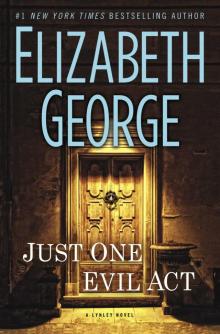 Just One Evil Act
Just One Evil Act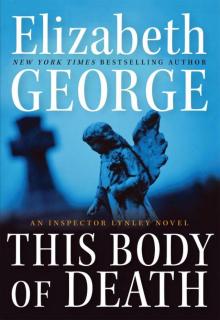 This Body of Death
This Body of Death The Edge of the Water
The Edge of the Water For the Sake of Elena
For the Sake of Elena Believing the Lie
Believing the Lie The Edge of the Shadows
The Edge of the Shadows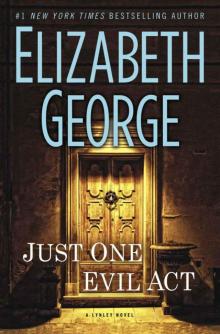 Just One Evil Act: A Lynley Novel
Just One Evil Act: A Lynley Novel In Pursuit of the Proper Sinner
In Pursuit of the Proper Sinner A Moment on the Edge:100 Years of Crime Stories by women
A Moment on the Edge:100 Years of Crime Stories by women Elizabeth I
Elizabeth I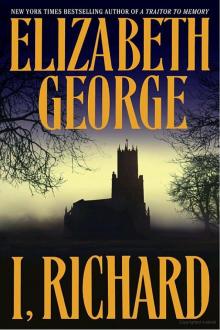 I, Richard
I, Richard A Traitor to Memory
A Traitor to Memory Missing Joseph
Missing Joseph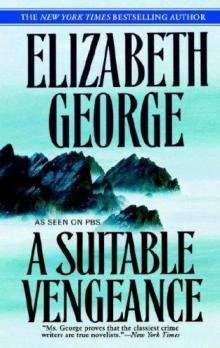 A Suitable Vengeance
A Suitable Vengeance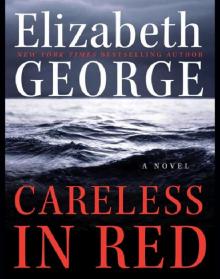 Careless in Red
Careless in Red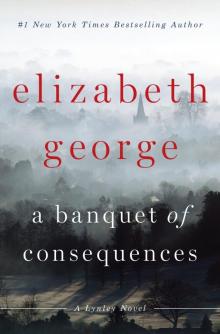 A Banquet of Consequences
A Banquet of Consequences Playing for the Ashes
Playing for the Ashes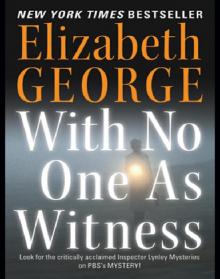 With No One As Witness
With No One As Witness Deception on His Mind
Deception on His Mind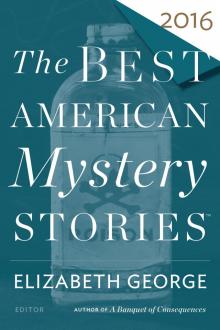 The Best American Mystery Stories 2016
The Best American Mystery Stories 2016 A Great Deliverance
A Great Deliverance In the Presence of the Enemy
In the Presence of the Enemy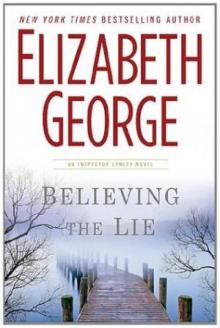 Believing the Lie il-17
Believing the Lie il-17 The Edge of the Light
The Edge of the Light SW01 - The Edge of Nowhere
SW01 - The Edge of Nowhere A Place of Hiding
A Place of Hiding What Came Before He Shot Her il-14
What Came Before He Shot Her il-14 Payment In Blood
Payment In Blood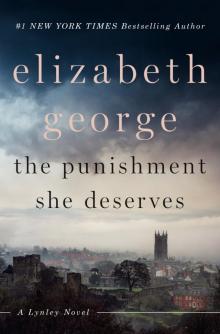 The Punishment She Deserves
The Punishment She Deserves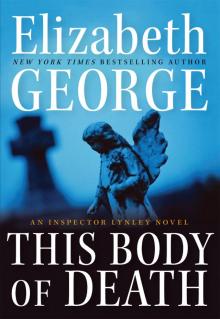 This Body of Death: An Inspector Lynley Novel
This Body of Death: An Inspector Lynley Novel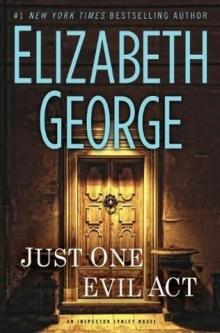 Just One Evil Act il-18
Just One Evil Act il-18 What Came Before He Shot Her
What Came Before He Shot Her Missing Joseph il-6
Missing Joseph il-6